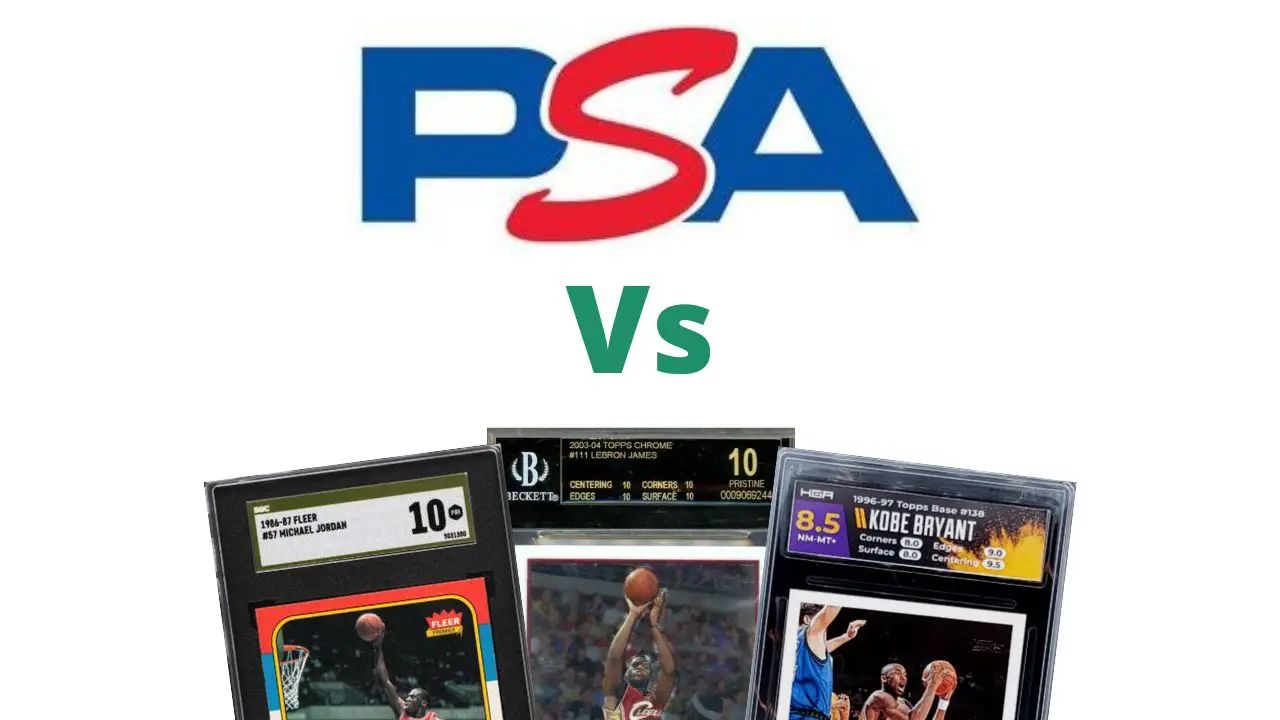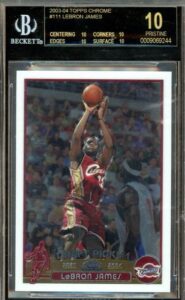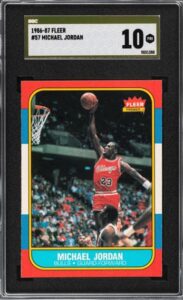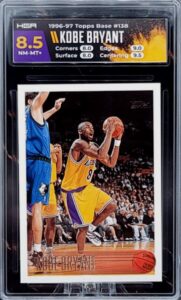
In recent years, card grading has become a huge part of the sports card hobby, and PSA is the most popular and well-known service right now.
But with the popularity and demand for PSA, there can often be longer wait times, and higher service prices, so what are the best alternatives?
Well, in my opinion, these are the best options:
- SGC
- Beckett
- HGA
My personal pick would be SGC; I think they offer a good mix of trust/reputation, label design, reasonable service prices and turnaround times.
I’ve covered all 3 companies in more detail below.
Table of Contents
BGS Grading

If you’re someone who’s been in the card collecting hobby for a while, then Beckett shouldn’t be a name that’s new to you. Beckett grading is just as well-known as PSA and close in popularity.
They have a slightly different grading scale to PSA, which includes sub-grades. So with Beckett, your card can grade a 9, 9.5 or 10 for example, whereas with PSA it’s either a 9 or a 10.
Beckett’s premium grade, the black label pristine 10, probably holds more value than any other grading in the hobby, including a PSA 10 – that’s because Beckett have a bit of a reputation for being ‘stricter’ when it comes to awarding their top grades, so for some collectors, it’s seen as the pinnacle, and that’s what gives it so much value.
Is Beckett better than PSA? There’s not a lot of difference between the two. They have slightly different grading scales but both are trusted by collectors and both hold weight in terms of value.
It’s worth noting you’ll have to pay a similar amount to grade with Beckett and the turnaround time is also going to be similar so if you’re looking for an alternative to PSA that gives you something better on one of those factors, then you’re best to consider a different option.
SGC Grading

For me, SGC offers the best alternative to PSA.
I think they offer the all-round package: Reputation, label design, reasonable turnaround times and service prices.
They’re also established enough now to increase the value of a card with a high grade enough to make it worth spending the money to have them graded.
They’re generally the go-to grading company for vintage cards among collectors in the hobby.
After changing a few years ago, they also now work with a 1-10 scale (with .5’s like Beckett) but they work on a pricing system whereby you pay based on the card’s declared value – so the more the card is valued at, the more you’ll pay for it’s grading.
SGC have been around a long time, and they know what they’re doing. They’ve also scaled well in terms of their workforce, and they’re able to offer good turnaround times – this is where they win big over PSA right now.
HGA Grading

HGA isn’t as well-known and established as PSA, BGS or SGC, but they do offer a solid option, depending on your wants.
They claim to have the best ‘slab designs’ on the market (hard to disagree) and offer something quite different to what PSA currently offers, which is digital grading.
They operate with a grading scale that is also 1-10 (with .5’s as well).
With the concept of grading cards with software still in its infancy, it hasn’t yet fully established itself and gained mass trust among collectors, certainly not to the level of PSA anyway – but that’s not to say it won’t in the future.
HGA are trying to change the game and move away from humans grading cards, which will definitely have its benefits in terms of turnaround times, if it does prove successful.
The design of their slabs also match the colors of the card design, so each slab will become more unique to a specific card, rather than having a standard slab design for all grades, as with PSA – something I think will appeal to many collectors.
If you’re looking for brand reputation and trust, which helps add more value to a card, then I wouldn’t recommend HGA as the best alternative to PSA, but if you want nice label designs for a personal collection, with good prices and turnaround times, then it’s a good option.
Why Is PSA Grading So Popular?
PSA are arguably the most well-known and most used card grading service right now.
Card collectors and investors know that a card encased with a PSA grading label, on the 1-10 scale, can raise it’s value on the market a lot, because they’re so well-known and trusted.
It’s like the hobby’s stamp of approval, or disapproval of a card’s condition and authenticity.
Collectors trust grading companies like PSA, because of their reputation, and that’s why they’re so popular.
Should You Go With PSA Or A Different Grading Service?
It really depends on your personal needs or wants.
With the popularity and demand for PSA grading comes high volumes, which makes wait times longer, and prices higher for their services.
It’s important to look beyond just turnaround times, and price, and remember that not all grading companies’ labels and slabs will hold the same weight that PSA does, in terms of trust and reputation.
Just because one company might be able to grade and return your card a lot quicker than PSA or even offer the service a lot cheaper, it doesn’t mean you should necessarily use them.
As I just mentioned, there’s a trust established on PSA grading, because the company has built that over many years, so collectors will pay a premium for highly graded PSA cards.
Label design is another consideration for collectors; If you just want graded cards in your personal collection, and you’re not bothered about the value add, then I would recommend going with the service that offers the label design you like the most, at a price and wait time that you’re happy with.
If you’re grading a card with the intention of increasing its value to sell for profit, it’s worth researching the value any given grading brand will add before making a decision.
Final Thoughts
The 3 alternative services I’ve listed above are definitely viable other options to PSA. BGS arguably have the same issues right now as PSA, because they’re also a hugely popular and well-known grading service, but they have the pull of the black label pristine 10 to consider.
SGC and HGA certainly offer a much faster service currently, and they both have differences to PSA which are appealing, such as SGC’s pricing system or HGA’s digital software grading, as well as their tailored slab designs.
If you’re grading to increase a card’s value, then make sure to check current values of each of those cards with grading from all the options you have, to see if it’s worth doing – then consider how fast you’ll have the card back in your hands.

